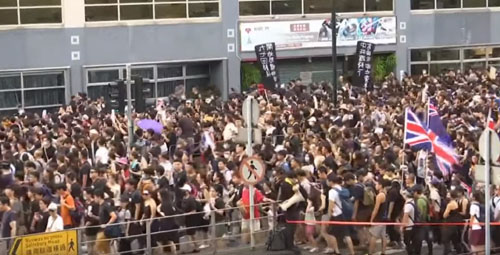by WorldTribune Staff, July 9, 2019
The Chinese and international media have largely ignored mass demonstrations in Hong Kong, which started as opposition to an extradition bill but have evolved into ongoing, full-fledged protests against Beijing’s increasingly heavy-handed rule over the autonomous territory.
While hundreds of thousands of protesters routinely jam the former British colony’s streets, Chinese media have not touched on the origins of the demonstrations. Any coverage instead focuses on clashes with police and damage to public property.

The protests continued on July 7 as tens of thousands of people, many wearing black shirts and some carrying British colonial-era flags, marched in Hong Kong, The Associated Press reported.
“Chanting ‘Free Hong Kong’ and words of encouragement to their fellow citizens, wave after wave of demonstrators streamed by a shopping district popular with mainland visitors on a march to the high-speed railway station that connects the semi-autonomous Chinese territory to Guangdong and other mainland cities,” the AP report said.
Organizers said 230,000 people marched on July 7.
State-run media outlets on July 2 ended their blackout of the Hong Kong protests by broadcasting footage of what was called “serious illegal actions” after a group of demonstrators stormed the parliament building in Hong Kong on July 1.
Censors allowed video to be shown of protesters smashing through glass barriers, writing pro-democracy slogans on the walls and displaying a British colonial flag.
“These violent assailants in their arrogance pay no heed to Hong Kong’s law, no doubt arousing the anger and sadness of all people of the city of Hong Kong,” said an editorial in Global Times, a Communist Party mouthpiece.
Massive protests had been taking place in Hong Kong a month before the state-run media lifted the coverage blackout.
“We want to show our peaceful, graceful protest to the mainland visitors because the information is rather blocked in mainland,” march organizer Ventus Lau said. “We want to show them the true image and the message of Hong Kongers.”
Many protesters on July 7 held placards, including one that read “Extradite to China, disappear forever.” Some carried the British flag or the old Hong Kong flag from when it was a British colony.
“This is our fourth march because we think this government is not taking care of Hong Kong,” said Dan Lee, who joined with his wife and their three children. “We need to save Hong Kong and we need to come out for our future generations.”
Hong Kong Chief Executive Carrie Lam said on July 9 that the controversial bill that would have allowed extradition to the Chinese mainland “is dead.”
Lam stopped short of saying the bill had been fully withdrawn, and protesters have vowed to continue the mass rallies.
“There are still lingering doubts about the government’s sincerity or worries whether the government will restart the process in the Legislative Council,” Lam told reporters. “So I reiterate here, there is no such plan. The bill is dead.”
Bonnie Leung of the Civil Human Rights Front, which has organized demonstrations, said further protests would be held until the Hong Kong government meets five key demands. These include the full withdrawal of the bill and the dropping of charges against those detained during recent protests.
“The bill is dead is a political description and it is not legislative language,” Civic Party lawmaker Alvin Yeung told the BBC, adding that the bill was technically still in the process of a second reading. “We have no idea why the chief executive refuses to adopt the word withdraw,” he added.
One of the leading figures of the protest movement, student activist Joshua Wong, reiterated the demand for the bill to be “formally withdrawn” and accused Lam of using wordplay to “lie to the people of Hong Kong.”
Intelligence Brief __________ Replace The Media
